Texas News
Texas Rep. Kay Granger Refuses Censure of Adam Schiff
Texas Rep. Kay Granger refuses to censure Adam Schiff after he lied to the American People.
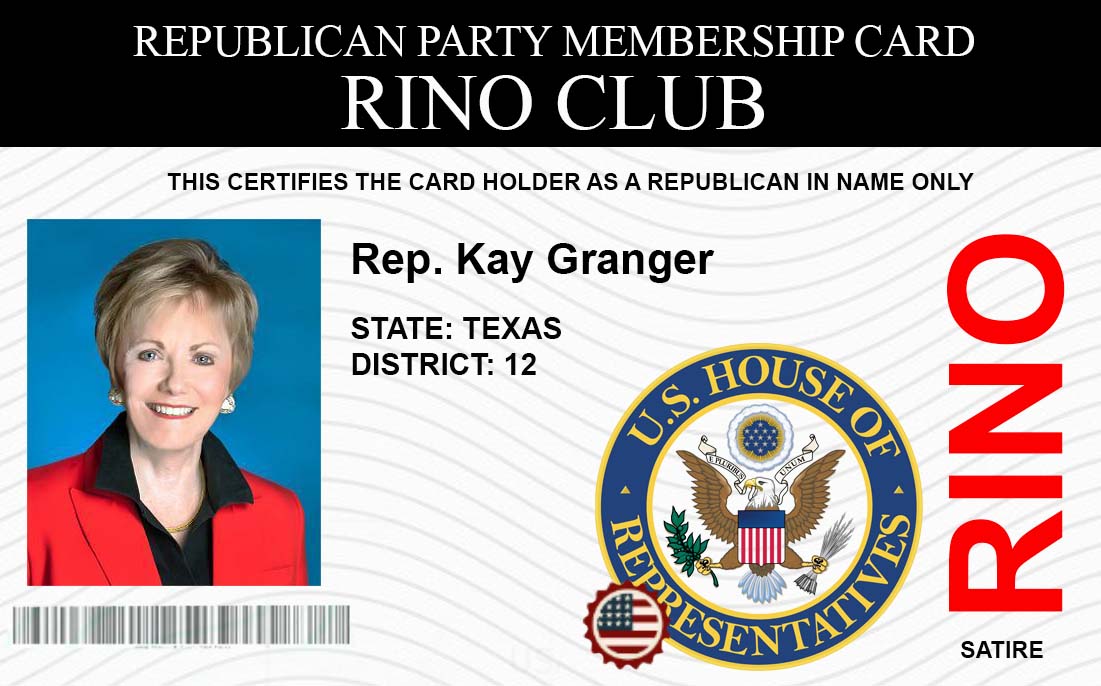
In the intricate web of American politics, every vote cast by an elected representative carries significant weight. Each decision can shape the trajectory of the nation, influence public opinion, and even determine the course of a political career. Rep. Kay Granger, a prominent Republican from Texas, recently found herself under intense scrutiny when she voted against the censure of Rep. Adam Schiff, a move that drew sharp criticism from fellow lawmakers and constituents alike. This controversial stance has sparked a wave of disappointment among Texas Republicans and has raised concerns about her commitment to holding elected officials accountable for their perceived unethical actions.
The Background
The contentious move to censure Rep. Adam Schiff emanates from allegations of misconduct and a perceived lack of integrity in his handling of classified information. Furthermore, Rep. Schiff has been accused of making deliberately false public statements regarding the alleged “Russian Collusion” narrative against former President Donald Trump. Many lawmakers, both Republican and Democrat, saw the censure as a necessary step to restore ethical standards and ensure public trust in the political process.
Rep. Granger’s Opposition
Rep. Kay Granger’s decision to oppose the censure of Rep. Schiff has left many questioning her judgment, principles, and loyalty to the American people. Critics argue that by refusing to support accountability measures against Rep. Schiff, she is undermining the integrity of the House of Representatives and sending a troubling message that Congress members may believe themselves to be above the law.
One of the primary concerns raised by Rep. Granger’s opposition to the censure is the potential impact on the ethical standards expected of elected officials. The core tenet of representative democracy is that lawmakers should be held accountable for their actions and decisions. When a representative, such as Rep. Schiff, faces credible allegations of misconduct, it is incumbent upon their peers to investigate and take appropriate action. Rep. Granger’s vote against censure has ignited a fierce debate about whether elected officials should be held to the same ethical standards as the citizens they represent.
Constituents’ Disappointment
Moreover, Rep. Granger’s actions appear to be in stark contrast with the sentiments of her constituents, who expect their elected representative to prioritize ethical conduct and demonstrate a steadfast commitment to upholding high standards in public office. Serving the 12th district of Texas for an impressive 27 years, Rep. Granger has enjoyed a long and successful political career. However, her recent vote has sparked a significant demand for legislation that would enact term limits for members of Congress.
The Texas Liberty Journal contacted Mrs. Granger’s office by phone for comment. However, as of the publication of this article, she remained unresponsive. Furthermore, her official website has implemented restrictions, preventing individuals residing outside her district from contacting her directly. All emails sent to her office are directed to her assistant, who has thus far refused to provide any comment on Rep. Granger’s controversial vote.
Understanding Rep. Granger’s Position
To provide a comprehensive understanding of Rep. Granger’s position, it is essential to explore the factors that may have influenced her decision to oppose the censure of Rep. Schiff.
- Establishment Loyalty: In today’s highly polarized political climate, loyalty to one’s party often plays a significant role in lawmakers’ decisions. Rep. Granger’s allegiance to the establishment may have swayed her vote.
- Concerns about Due Process: Some argue that Rep. Granger’s opposition to censure might be rooted in a belief in the importance of due process. They may argue that allegations against Rep. Schiff should be thoroughly investigated before punitive measures are taken.
- Political Calculations: Elected officials often make decisions based on the potential impact on their political careers. Rep. Granger, with her extensive experience, may have calculated that supporting the censure could have adverse effects on her standing within the Establishment Republican Party, and her chances of re-election.
- Constituent Pressure: While Rep. Granger’s vote has disappointed many constituents, it is possible that she faces pressure from a specific segment of her district that supports Rep. Schiff and opposes his censure.
- Personal Convictions: Lawmakers occasionally vote against their party or popular opinion due to deeply held personal convictions. Rep. Granger may genuinely believe that censure is not the appropriate response to Rep. Schiff’s actions.
The Call for Term Limits
One unexpected consequence of Rep. Granger’s controversial vote has been a growing demand for term limits for members of Congress. Term limits have long been a topic of debate in American politics, with proponents arguing that they can bring fresh perspectives, prevent entrenched political power, and reduce the influence of special interests.
In Rep. Granger’s case, her lengthy tenure in Congress has come under scrutiny due to her opposition to the censure of Rep. Schiff. Many Texans, including those who have supported her in the past, now question whether long-serving representatives become disconnected from the needs and values of their constituents. This debate over term limits has taken center stage in discussions about the future of American democracy and the role of career politicians in shaping its destiny.
The Texas Liberty Journal’s Efforts
The Texas Liberty Journal, as a responsible and conscientious source of political news and analysis, reached out to Rep. Granger’s office to seek her perspective on the controversial vote. Unfortunately, her lack of response has left many constituents and observers disappointed. In a democracy, transparency and communication between elected officials and the public are crucial elements in maintaining trust and accountability.
The restriction on communication via her official website, which limits contact to residents of her district, has also drawn attention. While it is customary for constituents to have direct access to their representatives, this practice has raised concerns about transparency and accountability. In an age of increasing digital connectivity, such restrictions may be viewed as an attempt to control the narrative and limit engagement with a broader audience.
The controversy surrounding Rep. Kay Granger’s decision to oppose the censure of Rep. Adam Schiff has ignited a passionate debate about ethics, accountability, and the role of long-serving representatives in American politics. While her vote may have been influenced by various factors, including party loyalty and personal convictions, it has left her constituents and the broader public questioning the integrity of their elected officials.
Moreover, the call for term limits in Congress has gained momentum, with Rep. Granger’s lengthy tenure serving as a focal point for this discussion. The Texas Liberty Journal’s efforts to seek her perspective and the limitations on communication through her official channels have further fueled the controversy.
As this debate continues to unfold, it serves as a reminder of the profound impact that individual votes can have on the perception of elected officials and the direction of our democracy. The scrutiny faced by Rep. Granger is a testament to the importance of ethical conduct, accountability, and open dialogue in the realm of American politics.
Election
Texans to Vote on 17 Constitutional Amendments, with Historic Homestead Exemption in Spotlight
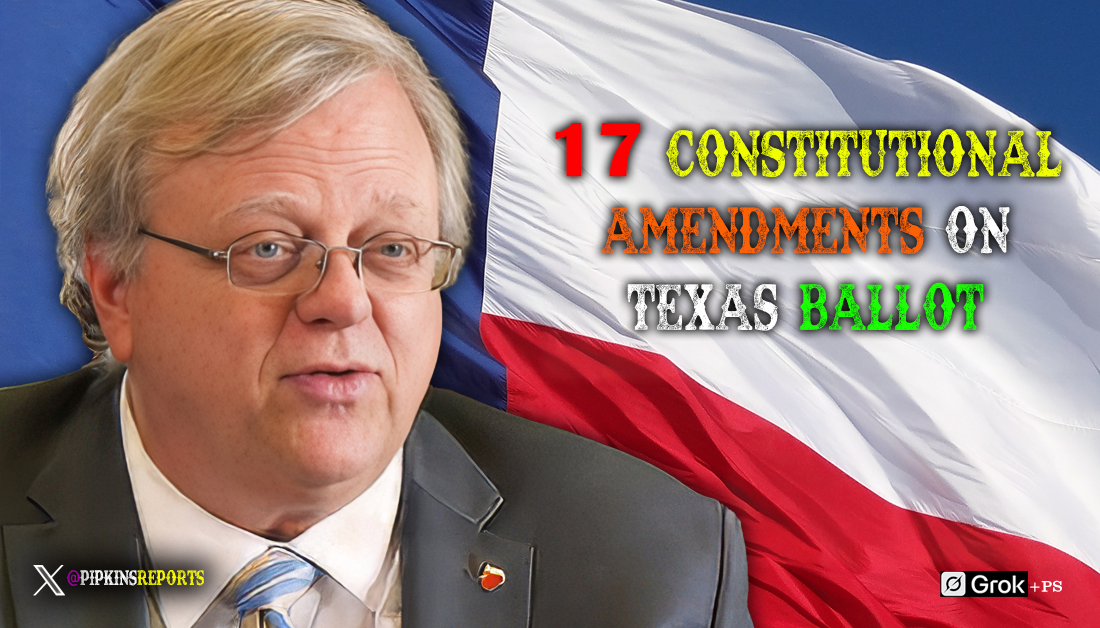
AUSTIN, TX — On November 4, Texas voters will face a marathon ballot featuring 17 proposed amendments to the state’s constitution, a document that has seen over 500 revisions since 1876. Secretary of State Jane Nelson, who oversaw the ballot order draw, urged Texans to seize this chance to “make your voice heard about the governing document of our state.” From tax relief to judicial reform, these propositions reflect a conservative vision of limited government, economic liberty, and state sovereignty. But one measure, Proposition 13, stands out as a landmark effort to deliver substantial property tax relief to homeowners—a cornerstone issue for Texans grappling with rising costs in a state without an income tax.
Proposition 13: A Game-Changer for Homeowners
At the heart of this constitutional lineup is Proposition 13 (SJR 2), which would raise the homestead exemption for school district property taxes from $100,000 to $140,000, with an even higher $150,000 exemption for seniors and disabled homeowners. Paired with a tax rate compression in Senate Bill 1, this measure promises an average savings of $496.57 for homeowners, according to Sen. Paul Bettencourt (R-Houston), the bill’s author. In a unanimous vote, the Texas Senate signaled its commitment to easing the property tax burden, a perennial concern for Texans facing skyrocketing appraisals.
For many, Proposition 13 is a lifeline. Bettencourt noted that 80 to 90% of Texas seniors could pay zero school district property taxes under this plan, as would average homeowners in 49% of Texas school districts where home values fall below $140,000. This is no small feat in a state where property taxes fund much of public education. To address concerns about local revenue losses, Bettencourt emphasized that the state would reimburse school districts, ensuring they remain fully funded. “Today, the Texas Senate delivered a win for homeowners statewide,” he declared, framing the measure as a victory for taxpayers without sacrificing educational quality.
Yet, some lawmakers raised red flags during Senate debates, warning that local taxing entities—cities, counties, and special districts—might offset these savings by raising their own rates. This tension underscores a broader challenge: balancing tax relief with the fiscal needs of local governments. For constitutional conservatives, Proposition 13 embodies the principle that government should prioritize returning money to citizens, but voters must weigh whether the state’s reimbursement plan can prevent local tax hikes that could erode the promised relief.
A Broader Conservative Agenda
While Proposition 13 takes center stage, the remaining 16 amendments advance a robust conservative agenda. Proposition 2 (SJR 18) bans taxes on capital gains—realized or unrealized—protecting wealth creation from state overreach. Proposition 6 (HJR 4) shields securities transactions from occupational or transactional taxes, bolstering financial markets. Proposition 8 (HJR 2) prohibits death taxes on estates or inheritances, ensuring families keep more of their legacy.
Other tax relief measures include Proposition 5 (HJR 99), exempting animal feed held for retail from ad valorem taxes, and Proposition 9 (HJR 1), which extends similar exemptions to income-producing personal property. Proposition 7 (HJR 133) offers tax breaks for surviving spouses of veterans with presumed service-connected conditions, while Proposition 10 (SJR 84) provides temporary exemptions for homestead improvements destroyed by fire. Proposition 11 (SJR 85) further boosts exemptions for elderly and disabled homeowners, complementing Proposition 13’s focus on homestead relief.
Infrastructure and education also feature prominently. Proposition 1 (SJR 59) creates a permanent fund for the Texas State Technical College System, supporting trade programs vital to Texas’ economy. Proposition 4 (HJR 7) dedicates sales tax revenue to the Texas Water Fund, addressing water scarcity in a growing state. Proposition 14 (SJR 3) establishes a $3 billion Dementia Prevention and Research Institute, though its hefty price tag raises questions about fiscal priorities.
Safety, Sovereignty, and Civic Values
Public safety and border security are addressed in Proposition 3 (SJR 5), which mandates bail denial for certain felony offenses, and Proposition 17 (HJR 34), which offers tax exemptions for border security infrastructure in counties along the U.S.-Mexico border. Both align with conservative priorities of law and order and state sovereignty, though the latter’s vague definition of “infrastructure” warrants scrutiny.
Cultural and civic concerns shine through in Proposition 15 (SJR 34), affirming parents as the primary decision-makers for their children—a rebuke to institutional overreach in schools and healthcare. Proposition 16 (SJR 37) clarifies that only U.S. citizens may vote, reinforcing election integrity amid national debates. Proposition 12 (SJR 27) reforms the State Commission on Judicial Conduct, enhancing accountability for judicial misconduct, a move conservatives will welcome as a check on judicial power.
With early voting from October 20-31 and a registration deadline of October 6, Texans must act swiftly to study these amendments. Detailed information is available at VoteTexas.gov. Proposition 13, with its promise of historic tax relief, may dominate headlines, but the full slate demands careful consideration. Each amendment shapes the delicate balance between individual liberty and public needs, a balance constitutional conservatives hold dear.
As Texas voters head to the polls, they carry the weight of self-governance. In a state fiercely proud of its independence, this election is a chance to reaffirm principles of limited government and personal freedom—nowhere more so than in Proposition 13, which could redefine the financial burdens of homeownership for millions. The question is whether Texans will embrace this vision or demand greater clarity on its long-term impacts.
Featured
Attorney General Ken Paxton Secures $1.4 Billion Settlement with Meta Over Unauthorized Biometric Data Capture

Texas Attorney General Ken Paxton has successfully negotiated a $1.4 billion settlement with Meta Platforms, Inc. (formerly known as Facebook) over allegations of unauthorized biometric data collection. This settlement, the largest ever obtained from a single state’s action, underscores the importance of protecting privacy rights in the digital age and sets a new precedent for holding technology giants accountable.
Background and Context
The roots of this historic settlement trace back to 2011 when Meta introduced a feature known as Tag Suggestions. This feature, designed to improve user experience by making it easier to tag individuals in photographs, operated by using facial recognition technology to automatically identify people in photos uploaded to Facebook. While the feature was promoted as a convenience, it also involved the surreptitious collection and use of biometric data without users’ informed consent.
Biometric data, which includes unique identifiers such as facial geometry, is considered highly sensitive due to its permanent and unchangeable nature. Recognizing the potential for abuse and the need for stringent protections, Texas enacted the “Capture or Use of Biometric Identifier” Act (CUBI) to regulate the collection and use of such data. Under CUBI, businesses are required to inform individuals and obtain their explicit consent before capturing their biometric identifiers.
However, Meta’s implementation of facial recognition technology violated these legal requirements. The company turned on the Tag Suggestions feature by default, capturing biometric data from millions of Texans without proper disclosure or consent. This practice persisted for over a decade, impacting virtually every user who uploaded photos to the platform.
The Legal Battle
In February 2022, Attorney General Ken Paxton filed a lawsuit against Meta, accusing the company of violating Texas’s biometric privacy and consumer protection laws. The lawsuit argued that Meta’s actions not only breached CUBI but also constituted deceptive trade practices under Texas law. The primary allegations included:
- Unauthorized Biometric Data Collection: Meta collected biometric identifiers from Texans without their informed consent, a clear violation of CUBI.
- Deceptive Practices: By failing to disclose the true nature and extent of its data collection practices, Meta misled users about the privacy implications of using its platform.
- Privacy Violations: The unauthorized use of facial recognition technology posed significant privacy risks, given the sensitive nature of biometric data.
Attorney General Paxton’s office emphasized the significance of the case, noting that it was the first lawsuit brought and the first settlement obtained under Texas’s CUBI Act. The legal action aimed not only to secure justice for affected Texans but also to send a strong message to other companies about the importance of complying with privacy laws.
Settlement Details
After two years of vigorous litigation, the parties reached a settlement agreement in 2024. Meta agreed to pay the state of Texas $1.4 billion over five years, marking the largest privacy settlement ever obtained by an Attorney General. This settlement dwarfs the previous record, a $390 million settlement a group of 40 states obtained from Google in late 2022.
The settlement includes several key provisions designed to ensure future compliance and protect Texans’ privacy rights:
- Consent Requirement: Meta must obtain explicit, informed consent from users before collecting any biometric data. This includes clear and conspicuous disclosures about the types of data being collected and the purposes for which it will be used.
- Data Deletion: Meta is required to delete all previously collected biometric data that was obtained without proper consent. This includes data collected through features like facial recognition.
- Transparency Measures: Meta must implement enhanced transparency measures, providing users with easy access to information about the data being collected and how it is being used. This may involve updates to privacy policies and user interfaces.
- Compliance Audits: Meta will be subject to regular compliance audits to ensure adherence to the new data collection practices. These audits will be conducted by an independent third party, with the results reported to the Texas Attorney General’s office.
- User Control: Meta must provide users with greater control over their biometric data, including options to opt-out of data collection and to request the deletion of their data at any time.
- Training and Policies: Meta is required to implement comprehensive training programs for its employees on data privacy and biometric data handling. Additionally, the company must establish and enforce internal policies to ensure compliance with the new requirements.
Statements and Reactions
Attorney General Ken Paxton hailed the settlement as a significant victory for Texans and a warning to other companies. “After vigorously pursuing justice for our citizens whose privacy rights were violated by Meta’s use of facial recognition software, I’m proud to announce that we have reached the largest settlement ever obtained from an action brought by a single State,” Paxton stated. “This historic settlement demonstrates our commitment to standing up to the world’s biggest technology companies and holding them accountable for breaking the law and violating Texans’ privacy rights. Any abuse of Texans’ sensitive data will be met with the full force of the law.”
The legal teams involved in the case also played a crucial role in securing the settlement. Keller Postman and McKool Smith served as co-counsel to the Texas Attorney General’s office, with Zina Bash, Sam Baxter, and Jennifer Truelove leading the litigation efforts. Their aggressive litigation posture and expertise in privacy law were instrumental in achieving this landmark outcome.
Implications and Future Impact
The $1.4 billion settlement has far-reaching implications for both Meta and the broader technology industry. For Meta, the financial penalty and mandated changes to its data collection practices represent a significant shift in how the company handles biometric data. The settlement serves as a wake-up call, highlighting the need for transparency and user consent in data-driven business models.
For the technology industry, the case sets a new standard for privacy protection and regulatory compliance. It demonstrates that state governments can and will take decisive action against companies that violate privacy laws, regardless of their size or influence. The settlement may encourage other states to enact or strengthen their biometric privacy laws, leading to increased scrutiny of data collection practices nationwide.
Privacy advocates have lauded the settlement as a major step forward in safeguarding consumer rights. The case underscores the importance of robust legal frameworks to protect individuals from unauthorized data collection and misuse. As digital technologies continue to evolve, ensuring that privacy laws keep pace with technological advancements remains a critical priority.
Conclusion
The $1.4 billion settlement between Texas and Meta marks a historic moment in the fight for digital privacy. It reflects the determination of Attorney General Ken Paxton and his team to hold technology companies accountable for violating privacy rights and sets a powerful precedent for future enforcement efforts. As Texans benefit from the strengthened protections and increased transparency resulting from this settlement, the case stands as a testament to the importance of vigilant oversight and robust legal safeguards in the digital age.
People
Daniel Miller and the TEXIT Debacle: The Incompetence that Doomed a Movement

In the expansive realm of Texas politics, Daniel Miller, the dynamic President of the Texas Nationalist Movement (TNM), has been a fervent advocate for the TEXIT movement since its inception in 1996. Recognized on major news networks and international outlets, Miller’s charismatic stance on Texas independence has positioned him as a central figure in the Lone Star State’s political landscape. As the face of the TEXIT movement, Miller’s leadership warrants scrutiny, delving into both successes and challenges that shape the narrative of his tenure.
Background History of Daniel Miller:
Daniel Miller, a sixth-generation Texan, brings a unique blend of tech consultancy and entrepreneurial spirit to the TEXIT movement. His political journey, however, is marked by setbacks. In the 2012 House District Republican primary, Miller faced a formidable defeat against Allan Ritter, securing only 27% of the votes. Undeterred, he ventured into the 2022 Texas Lt. Governor primary, yet the outcome echoed his previous loss, with Dan Patrick commanding 76% of the votes and Miller securing a distant second with just 7%. These early challenges in Miller’s political career provide context for the hurdles he would later navigate in steering the TEXIT movement toward its goal of Texas independence.
The Texas Nationalist Movement (TNM):
The TNM, under Daniel Miller’s leadership since its evolution in 2005, has become a pivotal force in Texas politics, not because of Miller’s involvement, but in spite of it. Evolving from a faction of the old Republic of Texas, the TNM’s mission is explicit: “the complete, total and unencumbered political, cultural and economic independence of Texas.” Operating as an unincorporated association, the TNM’s focus on peaceful political advocacy, education, and the pursuit of a statewide referendum sets the stage for the TEXIT movement. Miller’s role extends beyond advocacy, as he testifies on legislation and participates in conferences globally, solidifying the TNM’s status as a formidable political entity.
Series of Failures:
Referendum Mishaps:
The handling of the TEXIT referendum became a critical juncture in Miller’s leadership. He failed to understand the law and submit ballots on time. He failed to understand the legal requirement for wet signatures. And technical glitches on the petition website likely meant that many more signatures could have been obtained. These missteps not only delayed the movement’s momentum but raised questions about the TEXIT leadership’s competence and preparedness.
The technical failure of the petition website was particularly problematic. For days, perhaps weeks, programming errors plagued the platform, preventing individuals from completing the registration process. The system’s incapacity to rectify errors disenfranchised countless individuals. The severity of these issues questioned the TEXIT movement’s technological infrastructure and its ability to navigate complex legal processes. We should also mention that this is actually the type of business that is Miller’s main job … and it failed miserably.
TEXITCON Press Restrictions:
The TEXITCON event, which was a great idea that was long overdue, faced a critical misstep under Miller’s leadership – a failure to allow free press opportunities. The Texas Liberty Journal’s attempts to secure a press pass were met with complete silence, pointing to a broader issue of restricted media coverage and public awareness. Access to the event would only be possible if one paid for admission. This is not how the press operates and any amateur event organizer would know this. This communication breakdown not only hindered media engagement but also raised concerns about the real motivations of the event. Was it about awareness and organization? Or was it just about making money?
This press restriction holds broader implications. Limited media coverage restricts the dissemination of information about the TEXIT movement’s goals, progress, and activities. The absence of a robust media presence opens the door to misinformation and limits constructive public discourse. In a movement where public perception is pivotal, stifling media access has far-reaching consequences, potentially isolating the TEXIT movement from valuable feedback and alternative viewpoints.
Legal Troubles and Financial Irregularities:
a. IRS Closure of 501c(4):
A significant episode under Miller’s leadership was the closure of TNM’s 501c(4) status by the IRS in May 2023. This move may signal legal troubles or it may once again represent incompetence. In the very least it represents a lack of transparency as no mention of this has been made by the TNM. The closure raises questions about the internal governance and financial practices of the Texas Nationalist Movement Inc. as well. Did they stop being a non-profit? Where is the money from the online store going?
The IRS closure unveils a broader challenge in managing the legal aspects of the movement. As a key advocacy organization, maintaining compliance with federal regulations is paramount. The closure not only tarnishes the image of the TNM but underscores the importance of robust governance mechanisms in movements of this nature.
b. Business Registration Shell Game:
Further scrutiny reveals a concerning practice – the shelling of the Texas Business Registration through another company, “TNM Protective Services, LLC.” This maneuver introduces an element of opaqueness into the organizational structure. Coupled with the inactive status of the “Texas Nationalist Movement Foundation Inc”, this prompts questions about organizational transparency and accountability.
The use of multiple entities and the status of these entities raise concerns about financial practices and organizational integrity. Advocating for political, cultural, and economic independence necessitates a level of transparency that aligns with the movement’s core values. The complexities in business registration demand a closer examination of the TEXIT movement’s financial strategies and its commitment to ethical conduct.
c. Lost Domain Name
When Miller launched his book in 2020 “Texit: Why and How Texas Will Leave The Union“, the back cover of his book listed his domain as www.DanielMiller.com. Sometime after the publication he lost control of his own domain. This often happens when the owner fails to pay the renewal fee to their domain host. Generally, domain names run about $15.00 / year but when the owner fails to renew a domain, ‘squatters’ can jump in and grab it. Often, they will then jack up the price and hope that the owner will pay to have it restored. For common names, or names of celebrities, the fee can go up quite a bit. In this case, DanielMiller.com is currently offered for sale at $79,888.
Few in their right mind would pay such a fee and such a domain name is only valuable to a person who shares this name…that’s a pretty small market. This appears to be the case for Miller who has subsequently registered the domain www.DanielOMiller.com … adding the ‘O’. But the question remains, how does one fail to renew their own domain name? What does it say about a person’s management skills that they would fail at such a simple task? Miller has not returned our inquiry so we are unable to get his side of the story.
The Elusive Financial Trail:
The uncertainty surrounding the online TEXIT product store adds another layer to this financial opaqueness. With little information available about the revenue distribution and the company handling these transactions, questions linger about the accountability of the TEXIT movement. Transparency in financial matters is not just a legal requirement but a moral obligation, especially for a movement that seeks to empower Texans in determining their destiny.
Conclusion: A Call for Renewed Leadership in the TEXIT Movement
As we meticulously examine Daniel Miller’s leadership of the TEXIT movement, a pattern of failures and incompetence emerges, raising serious questions about his ability to steer the movement forward after over two decades. The challenges faced, from referendum mishaps to the restrictions on press freedom and legal and financial irregularities, paint a concerning picture of the movement’s current trajectory.
Delayed ballot submissions, a lack of understanding about legal requirements, and technical failures on the petition website, showcase a level of incompetence that is detrimental to a movement striving for Texas independence. These missteps not only hinder the momentum of TEXIT but also cast doubt on Miller’s capacity to navigate the intricate legal and technological landscape that such a movement demands.
The press restrictions observed at TEXITCON further underscore a deficiency in leadership. In a movement that claims to champion transparency and democratic principles, stifling media access raises serious concerns about accountability and openness. The lack of media engagement limits public awareness and stifles constructive discourse, hindering the movement’s ability to gain broad support.
The IRS shut down the 501c(4), a move that typically happens after a company fails to turn in its forms for 3 consecutive years. The questionable business registration practices that hide who is running the company reveal an unsettling lack of governance and transparency. For a movement that advocates for the political, cultural, and economic independence of Texas, such financial opaqueness is not just a red flag; it is a fundamental betrayal of the ideals the movement professes.
After more than 20 years under Miller’s leadership, it becomes imperative for the people invested in the TEXIT movement to critically assess its direction. The numerous failures and shortcomings raise a pivotal question: Is Daniel Miller the right leader to guide the movement into the future? A movement takes more than passion to succeed, it takes leadership, experience, and competence. Perhaps it is time for the people to seek out a new representative who can bring these fresh perspectives and a strategic understanding of the complexities of politics.
Moving the TEXIT movement forward requires adept leadership that can learn from past mistakes, adapt to challenges, and effectively navigate the intricate web of politics, legality, and public relations. The vision of a free and independent Texas is too significant to be hindered by the failures of the past. It is time for the people to seek a leader who can reinvigorate the movement, inspire confidence, and, most importantly, lead Texas toward a future that aligns with the aspirations of its people.
-

 Election1 week ago
Election1 week agoAbbott’s Backroom Play: How Greg Abbott Used a Legal Loophole to Install Kelly Hancock as Texas Comptroller Without Senate Confirmation
-

 Featured5 days ago
Featured5 days agoAbbott’s Veto of SB3 Saves Texas Hemp Industry, Sparks Battle Over Regulation
-
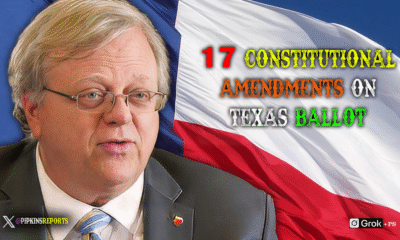
 Election2 days ago
Election2 days agoTexans to Vote on 17 Constitutional Amendments, with Historic Homestead Exemption in Spotlight


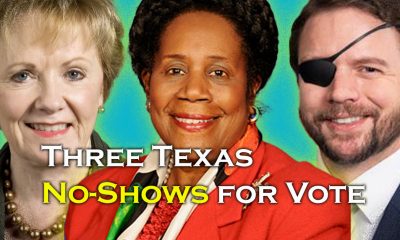

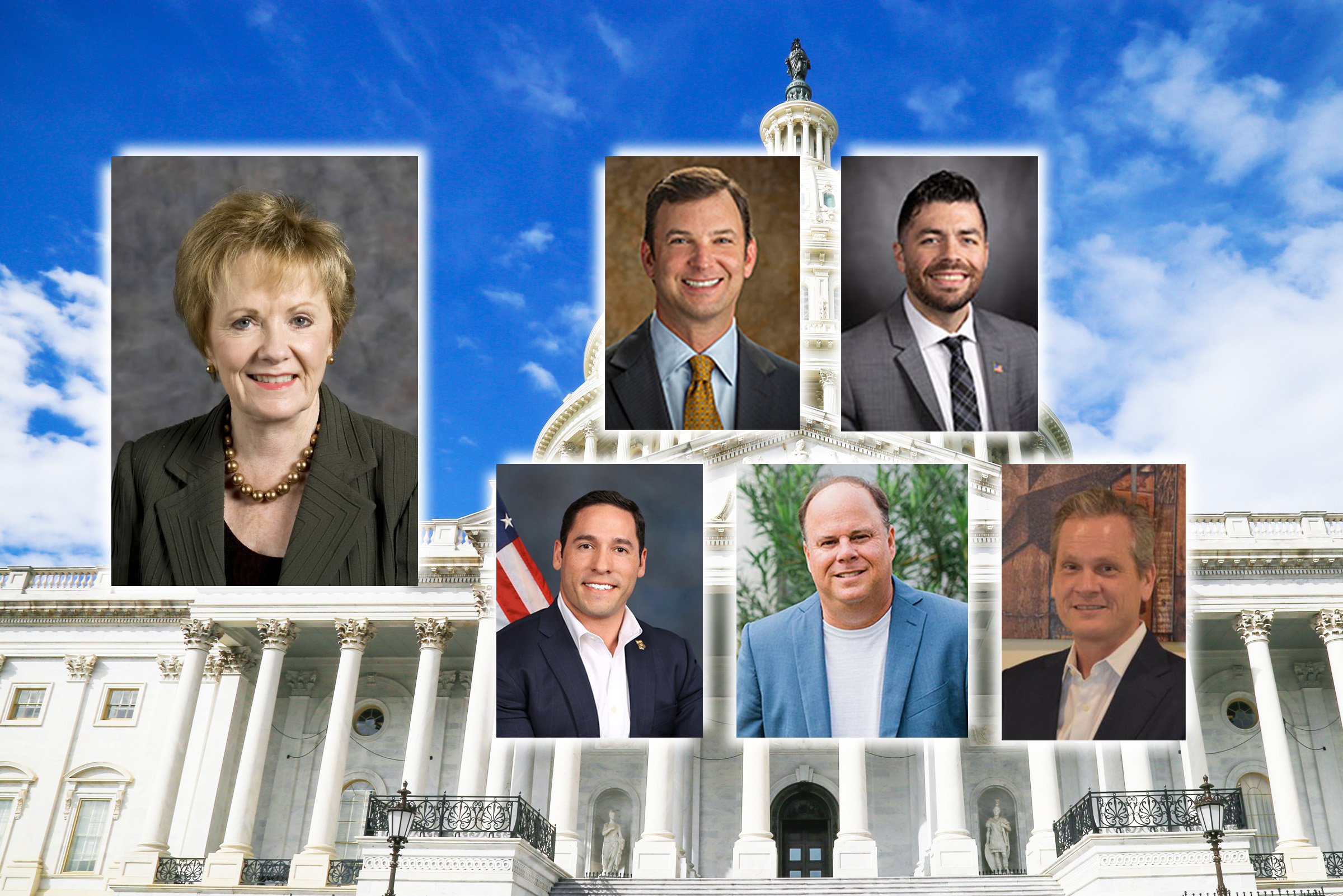

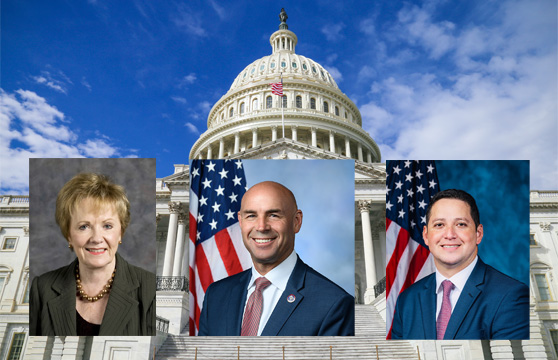
You must be logged in to post a comment Login